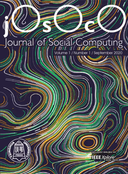Journal of social computing
JoSoCo
计算社会科学新刊推荐
Abbreviation:
J. Social Comput.
Published by:
IEEE Xplore Digital Library : Tsinghua University Press
Publisher Location: Piscataway, NJ, USA
Journal Website:
https://ieeexplore.ieee.org/xpl/issues?punumber=8964404&isnumber=10375931
Range of citations in the SafetyLit database:
2023; 4(1) --
2023; 4(1)
Publication Date Range:
2020 --
Number of articles from this journal included in the SafetyLit database:
1
(Download all articles from this journal in CSV format.)
eISSN = 2688-5255
LCCN = 2019201637 | USNLM = 9918402276106676 | OCLC = 1112112122
Find a library that holds this journal: http://worldcat.org/issn/26885255
Journal Language(s):
English
Aims and Scope (from publisher):
Journal of Social Computing (JSC) is an open access, peer-reviewed scholarly journal which aims to publish high-quality, original research that pushes the boundaries of thinking, findings, and designs at the dynamic interface of social interaction and computation. This will include research in (1) computational social science—the use of computation to learn from the explosion of social data becoming available today; (2) complex social systems or the analysis of how dynamic, evolving social collectives constitute emergent computers to solve their own problems; and (3) human computer interaction whereby machines and persons recursively combine to generate unique knowledge and collective intelligence, or the intersection of these areas. The editorial board welcomes research from fields ranging across the social sciences, computer and information sciences, physics and ecology, communications and linguistics, and, indeed, any field or approach that can challenge and advance our understanding of the interface and integration of computation and social life. We seek to take risks, avoid boredom and court failure on the path to transformative new paradigms, insights, and possibilities. The journal is open to a diversity of theoretic paradigms, methodologies and applications.
